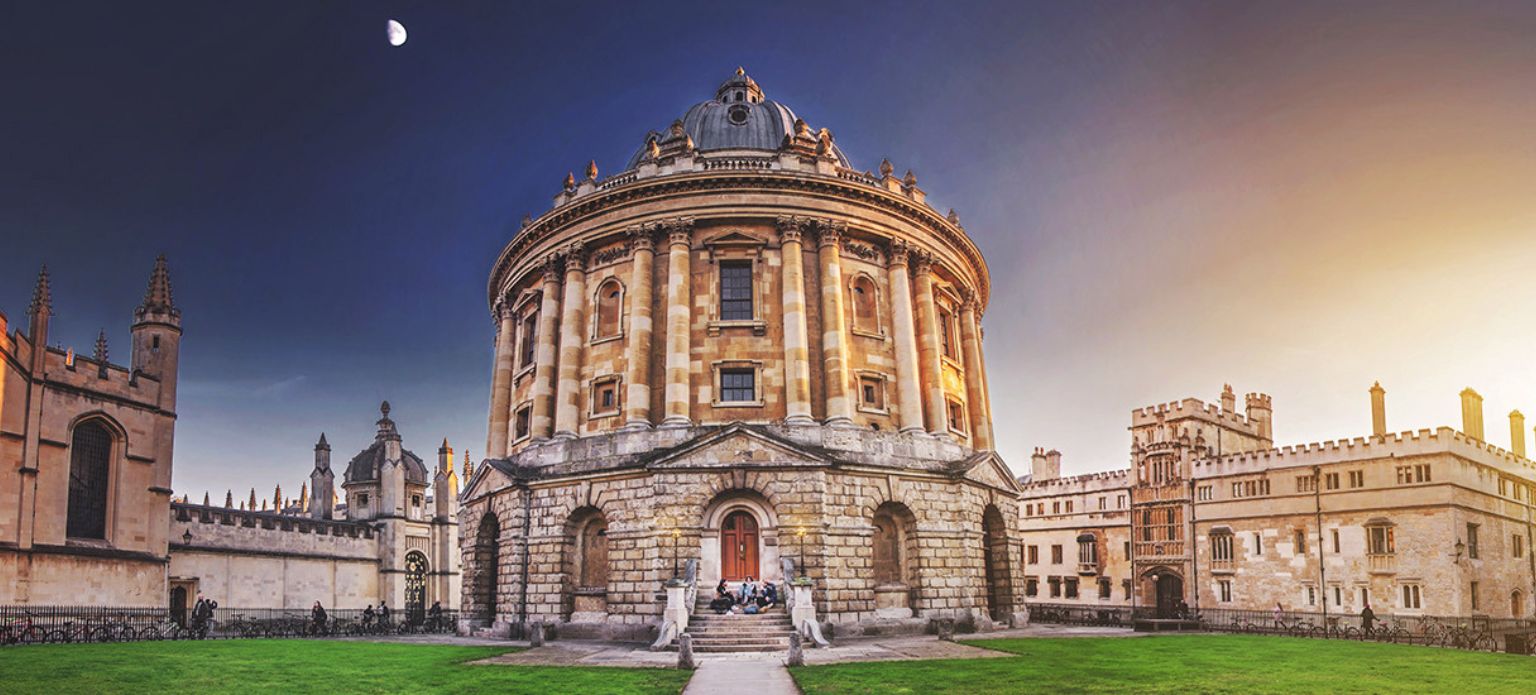
Study at Oxford University
- Categories All Study in Abroad Blogs, Study at Oxford University, Studying Abroad
- Date March 6, 2024
The University of Oxford is the oldest and the most top rated university in the English-speaking world. The University houses 26,000 students in their 39 semi-autonomous constituent colleges, 4 permanent private halls and a wide range of academic departments. The undergraduate students get lectures at their institutes as well as the central university, small-group tutorials and seminars, and laboratory work. Postgraduate teaching is, however, more centralised. These institutions act as self-governing entities. As a result, students experience Oxford differently in terms of membership, internal structure, activities and more. Their gorgeous English architecture inspired poet Matthew Arnold to entitle its city as the ‘city of dreaming spires’.
International students from more than 160 countries and territories are seen with dreamy eyes and aspiring shoulders. They make up to 45-50% of the student population in the campus. Oxford University in the UK, like they claim, is what you make it.
Campus and Courses
The institutes in the Oxford University has introduced numerous courses to students in the UK. There are 50+ UG courses, 200+ master level courses and research programs. All departments are essentially categories into 4 divisions. The division of Humanities includes Ruskin School of Art, Asian and Middle Eastern Studies, Languages, Literature and Philosophy. and Theology and Religion. The division of Mathematics includes everything from Biology and Chemistry to Earth Science and Material. They also have Begbroke Science Park dedicated to the departments of industrial science. The division of Physical & life Sciences holds their fort for Biochemistry, Experimental Psychology, Orthopedics, Rheumatology and Musculoskeletal Sciences and Population Health, while the division of Medical Sciences and Social Sciences does for Anthropology, Archaeology, Global and Area Studies, Law and Political and International Relations. Find more courses listed on Oxford’s official website.
The university is also rich in gardens, libraries and museums to encourage ideas to grow. There are 100 libraries across the central university library under the Bodleian Libraries, 1,500 cutting-edge experimental labs and world-famous museums and collections. Ashmolean Museum, founded in 1683 is dedicated to art and archaeology, while the Botanical Garden is headed strongly with awareness and education on the importance of plants in our lives at all levels into building a greener future. History of Science is where people, science, art and belief meet. The dinosaur genus called Megalosaurus in their Museum of Natural History was the first dinosaur to be named and described.
Contributing to around £15.7 billion to the UK economy, Oxford has a sterling reputation. Their shines are painted throughout their teaching, research and societal contributions. Their innovative and forward-thinking approach fulfills over 28,000 full time job roles only in the UK.
World-class Education
Surpassing all in Times Higher Education’s 2023 subject rankings for clinical and health and the subject rankings for computer science, the university makes newer and newer records almost every day. Studying at Oxford, you are in a place which is the 7th in the world for Nobel Laureates. You’ll be where the world shapes itself. You will encompass some of the smartest people in the world. 9 out 19 Prime Ministers Britain had in the 20th century have been alumni in Oxford. Famous minds like Albert Einstein and Oscar Wilde, Adam Smith, Hugh Grant and Cornelia Sorabji went to Oxford. At this point, we no longer ask what is special about Oxford University anymore; we know it defines excellence itself.
Undergraduates are taught by the leading experts of their field through tutorials. You will be challenged to think when tutored one-to-one by one of the sharpest minds of human history. The university environment nurtures the academic progression to learn in the most intensive way there is. And when you have a degree with their name on it, industry giants will court you as their employees with an endless array of dinner and reception invitations. Oxford wears 95% of their graduates as pride on their shoulders to have been employed within 6 months of graduating. When you do something as a student in Oxford University, the world stops to take notice. National newspapers report every inch of their student union president elections!
You may not be able to have a break during your time there, but you might not ever have to even introduce yourself to people. To top it all, Oxford offers bountiful financial support to eligible students.
Fees and Eligibility
Getting into Oxford is, of course, not everybody’s cup of tea. Admission rates are as low as 14% for UG admissions and 17% for PG. Undergraduate courses of 21 months to 5 years require IELTS score of 7.5, or PTE score of 76, and above. According to your course and institute, the average cost of tuition ranges from 29 Lakh to 47 Lakh. Post-graduation courses also require an IELTS score of 7.5 and above. One can pursue MFA with 33 Lakh, MBA and PGDM with 29 Lakh to 83 Lakh and MA and MS with 26 Lakh to 50 Lakh. Students who pass the requirements are weighed on their ability, enthusiasm, curiosity and commitment. As a student in Oxford, you have cutting-edge research facilities, unrivaled resources, personal and welfare support, academic guidance and a sense of community at your disposal throughout your time of learning.
How to Apply
International students must apply through UCAS (UG) and on Oxford Saïd application portal (PG/MBA) with a non-refundable application fee of 7,900 INR. Applications for undergraduate programs are closing on October 16, 2024 while that of MBA is closing on March 20, 2024. Oxford provides step by step support to aspirants on their official website.
Have a query, connect with us on 011 079 6000 6000 or +91 9624 000 201 and let our team guide you to your dream college.
You may also like

Ireland Intake 2024-25: Universities & Preparation Timeline

TOEFL Scoring System and Validity


